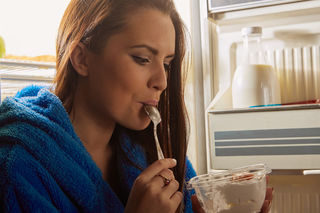Guilt
Would You Like a Side of Guilt With That Burger?
The bad habits that make us feel bad, and how to improve them.
Posted February 23, 2018

I used to think it was just me who found it fascinating to hear about what other people eat. But then there are those magazines that publish what celebrities eat across a day. And there are the other moms I socialize with that are always wondering what to pack for their kids’ lunches. And there’s the local Facebook group I joined called “Meals for real families,” because I was hoping to get some really easy dinner ideas. It seems to me that a lot of people wonder what others eat, and at the crux of this curiosity is guilt. What we are really thinking is, “I should eat better. I should find a way to get my children to eat better. I should be sure to make healthy meals for my family.”
In the Psychology of Eating class that I teach annually at Rutgers, students are required to complete a food diary and a reflection on that diary. I’ve read hundreds of students’ food diaries across the years. Often, the whole experience is somewhat disheartening. Students are strapped for time and cash and make bad choices — often. And they feel bad about what they eat.
In my research program, which for nearly 20 years has focused on eating behaviors, body image, and weight management, I often have people report on their food intake and the behaviors they participate in to manage or try to lose weight. Again, I’ve seen a lot of guilt surface. People know they should eat better, and yet they can’t seem to make it happen.
Across these teaching and research experiences, I’ve learned a lot about people’s eating habits. Here are five of the most common bad habits that make us feel bad — and some ways that these habits can be improved:
1. Starting off the day with relatively healthy choices, but allowing your choices to take a turn for the worse as the day progresses.
Improvement: Make a plan. It’s easy to get busy and then grab whatever you can find. Always keep a relatively healthy, nonperishable snack with you in a purse, backpack, or desk drawer, such as a single-serving bag of popcorn. Decide in the morning what you are going to make for dinner, before you get tired or less motivated. Then resist the urge to go to a drive-through on the way home.
2. Feeling bad about carbs consumed.
Improvement: Rethink carbs. Carbs are not the enemy. True, white bread and white pasta are not the best dietary choices, but they are not going to kill you. Carbs have been demonized in so many ways in the last decade that many people think they should be avoiding them all together. But carbs are a good source of energy — especially if you make good, whole-grain choices.
3. Eating out too much.
Improvement: Set limits on eating out — a certain number of meals, money, or days per week. You will almost always eat more when you eat out, and you’re likely to feel bad afterwards. Restaurant food is tasty, and the portions are large. Limiting your meals outside of your house will benefit your wallet and your waistline.
4. Not paying attention to what is eaten.
Improvement: Have designated times and places to eat. Don’t eat in the car or in front of the television or computer. Focus on enjoying food, and try not to eat mindlessly. Plan to eat meals with family or friends so that you have an actual meal, and don’t just graze across meal time and into the land of guilt.
5. Overeating due to being tired or stressed.
Improvement: Keep a log of how much you sleep, and try to sleep more. (You can’t get too much sleep.) A well-rested person is a less hungry and less stressed person. Did you know that even one day of poor or inadequate sleep can lead to overeating the next day? Try to manage stress with exercise instead of food. Go walk around the block when you want to grab a snack — or at least walk away from the snack foods.
At the end of the day, guilt doesn’t do us much good when it comes to food. It’s better to try to avoid guilt-inducing behavior and enjoy food as much as possible. Whatever choices we make, what we eat doesn’t determine our character or our worth.




